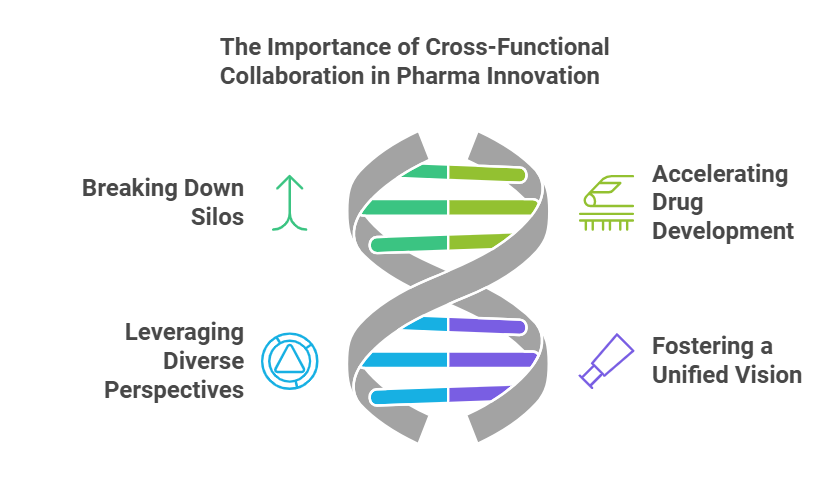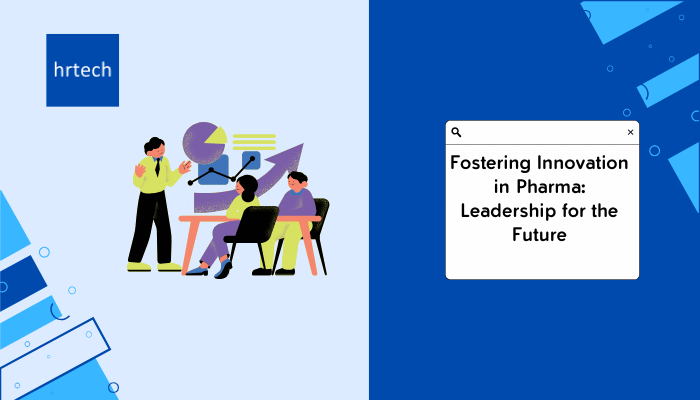The pharmaceutical industry is under increasing pressure to innovate, whether addressing new global health challenges, developing groundbreaking treatments, or maintaining a competitive edge in an ever-evolving market. Staying ahead requires strong leadership that prioritizes innovation and fosters a culture of continuous improvement.
Brainayan, a leader in fostering organizational transformation, is dedicated to empowering pharmaceutical leaders to overcome these challenges. Brainayan helps organizations drive research-driven innovation through customized strategies, navigate complex regulatory frameworks, and leverage digital tools for enhanced decision-making.
In this blog, we will explore how strong leadership in the pharmaceutical industry supported by insights and solutions from Brainayan can overcome common barriers to innovation, enhance R&D efforts, and shape a future-ready workforce capable of driving breakthrough advancements in pharma.
The Evolving Pharma Landscape and the Need for Continuous Innovation
The pharmaceutical industry is profoundly transforming, driven by advances in science and technology and changing global health needs. As healthcare evolves, the demand for new therapies and treatments intensifies, making innovation a cornerstone of industry success.
According to ZS, drug manufacturers encounter more burdensome access and pricing conditions in key markets as healthcare systems implement reforms to control spending. In the U.S., the government has revealed the first 10 products subject to price negotiations under the Inflation Reduction Act (IRA).
The increasing reliance on personalized medicine, cutting-edge technologies like artificial intelligence (AI), and the rapid pace of medical research demand a shift in how pharmaceutical companies approach R&D, regulatory approval, and global market expansion.
With healthcare systems worldwide under strain, there is a growing urgency to develop more effective treatments faster, with fewer side effects, and at a more affordable price. As a result, the pharmaceutical industry is now in a race not just to improve products but to do so with efficiency and sustainability.
Common Barriers to Innovation in the Pharmaceutical Industry
Innovation in the pharmaceutical industry is often stymied by several key barriers that leaders must navigate with precision and foresight.
Regulatory Compliance
One of the most significant challenges for pharmaceutical companies is adhering to a complex web of regulatory requirements across different countries. Regulatory bodies, such as the U.S. Food and Drug Administration (FDA) and the European Medicines Agency (EMA), impose strict guidelines to ensure drug safety and efficacy.
While these regulations are essential for patient safety, they can create delays in developing and approving new drugs. This requires a deep understanding of local and global regulatory environments and the ability to guide teams through the maze of digital transformation without stifling creativity or innovation.
High R&D Costs
The cost of bringing a new drug to market can exceed billions of dollars, with much of the expense tied to long research timelines, costly clinical trials, and regulatory approval processes. The high cost of R&D creates significant barriers to entry for new players and increases the risk of failure for existing companies.
For leaders, the pressure to manage R&D budgets efficiently while fostering innovation is immense. This financial burden can make companies hesitant to invest in long-term projects or high-risk, high-reward research initiatives.
However, effective leadership can help alleviate these challenges by prioritizing investments in technologies such as AI, which can optimize the R&D process, reduce costs, and accelerate drug development timelines.
The Role of Leadership in Driving Pharma Innovation
Leadership in the pharmaceutical industry plays a pivotal role in creating a culture of innovation. The ability to inspire, challenge the status quo, and foster collaboration across diverse teams can drive breakthroughs in leadership effectiveness, with drug development, patient care, and market strategy.
Leadership Traits That Foster an Innovative Culture
Leadership in the pharmaceutical industry plays a pivotal role in creating a culture of innovation. The ability to inspire, challenge the status quo, and foster collaboration across diverse teams can drive breakthroughs in leadership effectiveness, with drug development, patient care, and market strategy.
Leadership Traits That Foster an Innovative Culture
- Vision: Pharma leaders must have a clear, long-term vision for the company’s future, particularly about innovation. This vision should inspire employees and stakeholders to work together toward a common goal, whether developing cutting-edge therapies or streamlining the drug approval process.
- Resilience: Innovation rarely happens without setbacks. Pharma leaders must exhibit resilience, navigating failures and challenges with determination and a commitment to continual improvement.
- Adaptability: The pharmaceutical industry is constantly evolving. A leader who is flexible, open to new ideas, and ready to pivot when necessary is vital for fostering a culture of innovation.
The Importance of Cross-Functional Collaboration in Pharma Innovation

Leadership in the pharmaceutical industry must recognize the power of cross-functional teamwork and actively promote collaboration between diverse departments, from R&D to manufacturing to regulatory affairs and marketing.
With that in mind, let’s explore how fostering cross-functional collaboration is essential to overcoming barriers and driving innovation:
1. Breaking Down Silos
Pharma organizations often operate in functional silos, with teams working separately on different aspects of a project. While this structure can be efficient in some ways, it can also limit the flow of information and stifle creativity.
Strong leadership ensures teams communicate openly, share insights, and collaborate across departments. This collaboration allows for a holistic approach to innovation, where each functional team contributes expertise to the development process.
2. Accelerating Drug Development
Collaboration between R&D, clinical trials, and regulatory teams is critical to accelerating drug development. When leaders encourage regular communication between these groups, it can lead to faster decision-making, better understanding of the regulatory landscape, and identifying potential roadblocks early in the process. A unified approach reduces delays and enhances the speed at which new therapies can reach patients.
3. Leveraging Diverse Perspectives
Pharma innovation is enhanced when diverse perspectives are brought to the table. By promoting cross-functional collaboration, leaders can ensure that a wide range of ideas and viewpoints are considered. This diversity of thought helps identify novel solutions to complex problems, whether finding new drug candidates, improving clinical trial designs, or developing effective market strategies.
4. Fostering a Unified Vision
A key responsibility of leaders is to ensure that all teams align with a common purpose and vision. By clearly communicating company goals, pharma leaders can motivate employees across various functions to collaborate toward shared outcomes.
Cross-functional collaboration, underpinned by a unified vision, ensures that every department works together to deliver innovative therapies to patients.
Strategies for Fostering Innovation in Pharma
To foster innovation effectively, pharma leaders must adopt strategies that empower teams, drive research and development, and leverage new technologies.
Encouraging Creativity While Navigating Regulatory Frameworks
Innovation must be pursued within the confines of stringent regulatory standards, which sometimes feel like a barrier. However, strong leadership ensures that creativity is not stifled by compliance. Leaders must support teams in exploring innovative solutions while meeting all regulatory requirements.
Investing in R&D and Talent Development
The foundation of innovation in the pharmaceutical industry is research and development (R&D). Pharma leaders must prioritize R&D investments, not just in terms of financial resources, but also by fostering a culture of continuous learning.
Additionally, investing in talent development is key. Leaders must empower their teams with the necessary skills and expertise to work with new technologies and methodologies in drug discovery, clinical trials, and patient care.
Leveraging Digital Tools and Data Analytics for Better Decision-Making
Digital transformation is reshaping the pharmaceutical industry. AI, machine learning, and data analytics are vital tools for accelerating drug discovery, improving clinical trial outcomes, and enhancing patient care. Pharma leaders must prioritize digital adoption and foster an environment where data-driven decision-making becomes the norm.
According to a report by Deloitte, the pharmaceutical industry is increasingly embracing AI to accelerate drug discovery and improve efficiencies in clinical trials.
Leadership in the pharmaceutical industry must ensure that teams have the skills to harness these technologies effectively, from identifying potential drug candidates to predicting patient responses.
The Impact of L&D on Pharma Leadership Development
Strong leadership is essential for driving innovation and navigating complex challenges in the fast-evolving pharmaceutical industry.
L&D Programs Tailored to Pharma-Specific Challenges
Pharmaceutical leaders must be well-versed in regulatory compliance, digital transformation, and global market dynamics. Specialized L&D programs can provide training on navigating global regulations, integrating emerging technologies like AI, and expanding into international markets.
Upskilling Leaders for Managing Change and Uncertainty
Upskilling programs focus on enhancing their ability to manage shifting landscapes, whether adapting to new technologies, regulatory changes, or market disruptions.
- Building resilience to overcome setbacks
- Enhancing strategic thinking and decision-making under pressure
- Cultivating emotional intelligence to manage stress and support teams
- Developing innovative problem-solving capabilities
- Strengthening communication skills to inspire trust and clarity
These skills are essential for maintaining momentum in innovation, managing risks, and adapting to evolving market demands.
Future Trends in Pharma Leadership and Innovation
The pharmaceutical industry is entering an era of rapid transformation driven by emerging technologies and evolving healthcare needs. Leadership in the pharmaceutical industry will be pivotal in navigating this dynamic landscape, ensuring that companies remain innovative and adaptable to continuous disruption.
Emerging Technologies Reshaping Pharma
Technological advancements are reshaping every facet of the pharmaceutical industry. Artificial Intelligence (AI), machine learning, and precision medicine are just a few innovations accelerating drug discovery, improving patient outcomes, and optimizing clinical trials.
- AI and Machine Learning : Enable pharma companies to analyze vast amounts of data quickly, leading to more accurate predictions, faster drug development, and personalized treatments.
- Precision Medicine : Tailors medical treatment to individual genetic profiles, is revolutionizing how diseases are treated, moving beyond the “one-size-fits-all” approach.
- Blockchain Technology : Enhancing transparency and security in pharmaceutical supply chains, helping to reduce fraud, streamline drug traceability, and ensure that patients receive authentic, high-quality medicines.
- Digital Health Tools: Including wearable devices and mobile apps, are providing real-time patient monitoring and data collection, enabling proactive care, and enhancing clinical trial efficiency by offering continuous data streams.
As these technologies evolve, pharmaceutical leaders must be equipped to embrace and lead these changes. This will require a deep understanding of both the science and the strategic implications of emerging tech and the ability to integrate these innovations into their organizations.
Preparing Leaders for Continuous Disruption
The pharmaceutical industry’s future is one of constant change, driven by scientific breakthroughs, shifting regulations, and new business models. Leaders in the pharmaceutical sector must be prepared to navigate this uncertainty with agility and foresight.
- Agility and Adaptability: Leaders must stay flexible despite rapid technological advancements and be ready to pivot strategies when necessary.
- Continuous Learning: Keeping up with emerging trends like AI, genomics, and digital health will require ongoing education and training for pharma leaders.
- Change Management: As innovation accelerates, pharma leaders will need the skills to guide teams through disruptions, ensuring that technology adoption and organizational culture align.
By preparing for these challenges now, pharmaceutical companies can ensure that their leadership teams are ready to lead confidently in the face of a rapidly changing industry.
Conclusion
Effective leadership in the pharmaceutical industry is the driving force behind innovation. From embracing emerging technologies like AI and precision medicine to fostering a culture of creativity and collaboration, strong leadership ensures that pharmaceutical companies can navigate challenges and seize new opportunities.
To stay competitive in a rapidly evolving market, pharmaceutical companies must invest in leadership development programs tailored to the sector’s unique challenges. These programs equip leaders with the skills to manage change, drive innovation, and lead through uncertainty.
Imagine you’re ready to improve your leadership skills and spark innovation in your organization. Contact us to learn more about our tailored leadership development solutions for the pharmaceutical sector. Let’s create the leaders who will shape the future of pharma.





